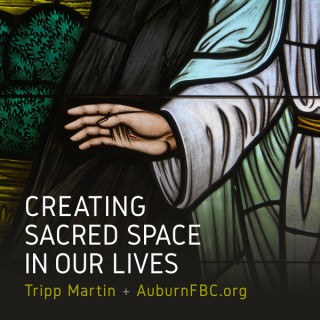Creating Sacred Space in Our Lives
Follow Creating Sacred Space in Our LivesA weekly devotional series presented by Tripp Martin, pastor of Auburn First Baptist Church. Auburn First Baptist Church is a free and faithful congregation of Christians, and a unique place of faith, learning, and ministry. For more information, visit AuburnFBC.org.
- Oct 31, 2022 LATEST EPISODE
- every other week NEW EPISODES
- 13m AVG DURATION
- 76 EPISODES
Latest episodes from Creating Sacred Space in Our Lives

"When Jesus complained, it was in defense of the vulnerable, in support of authenticity—and it never diminished others."

"We are thinking about the presence of God in the midst of unrest, disputes, or complaints. What does it mean to talk about holy discontent?"

We might want to earn forgiveness, but God's Forgiveness is a Gift.

When we draw closer to the pain of others, we also draw closer to the presence of God; because, that is where we find God's Love.

Instead of blaming Joseph, or just praising him, perhaps we can learn from him: recognizing how power can cloud our thinking.

No matter how great our faith might be, trouble finds us at our door.

Faith engages us with reality in front of us, but it also sparks our Holy Imagination.

When you serve someone, you get to see what people are like.

One of the quintessential questions over the course of Rogers' career and life is that question we heard him say countless times: "Won't you be my neighbor?"

We all have questions: questions about life and faith, through our experience of struggle or heartache, through our experience of creation and beauty, through our experience of joy and celebration.

The respect that Mr. Rogers had for children invites us all to never put a stumbling block in front of a child—to think about our words and our actions and how they shape the lives of children around us.

The message of Jesus was, "I like you as you are — I Love you as you are."

We can give thanks for the people who have cared for us, and remember the people in our lives that we can continue to turn to for wisdom, guidance, help, and assistance. None of us are meant to do this life alone.

In every neighborhood, we find helpers. In the face of all kinds of tragedy, there are people who respond with kindness, mercy, and assistance.

Oftentimes, we misunderstand what what it means to talk about the Peace of God.

If we see ourselves through the eyes of The Advocate — through the life and ways of Jesus — perhaps we can begin to look for those Good things in our neighbor, as well.

Mr. Rogers recognized the power of liturgy: the power of rhythms and routines.

We never want to pretend that there are easy solutions to the hard emotions that we feel — or the tragic circumstances that we face — but if we can talk about how we feel, it opens us up to the power of empathy — and to the path of healing.

Like a tree that's been transplanted, we need to give our roots time to find the nourishment that we need. It requires slowing down.

Fred Rogers thought of what he did as a ministry.

Throughout our lives, and in every aspect of our lives, we have this opportunity to create something new — what Jesus called New Creation.

When we stand there at a fork in the road, sometimes we are scared that if we make the wrong decision, everything else will fall apart. And, whatever decision we make—either way—God goes with us.

As we pray — thinking about our longings and our losses — we quickly discover that our words do reach their limit.

If we were to reflect on how we talk about God, do we use words that inadvertently limit God’s forgiveness?

Our vocation includes all that we do. It is our calling—our purpose. It is clarified by the practice of Sabbath, and it is shaped by God’s Goodness and Grace that is found at the center of Creation.








